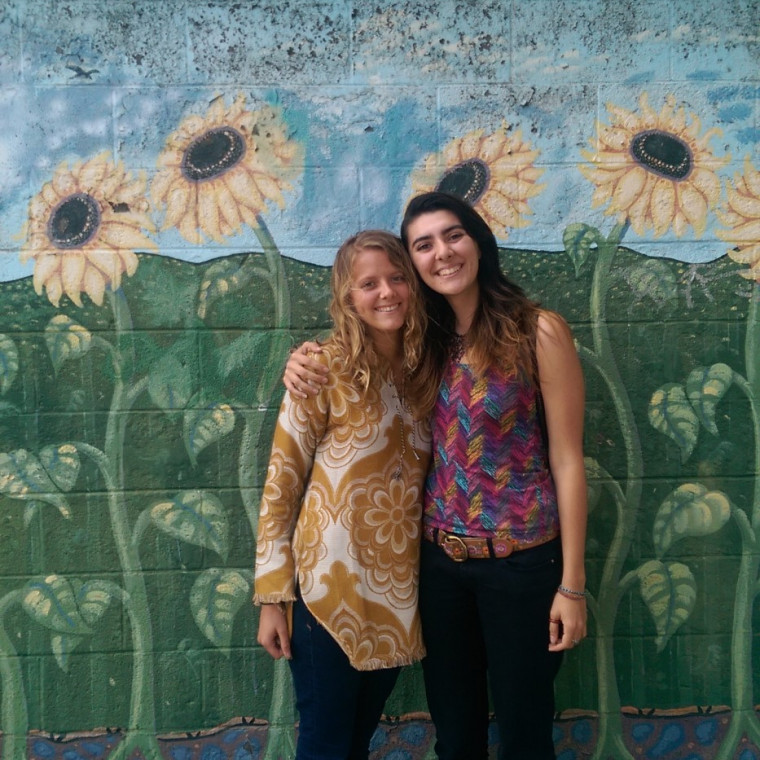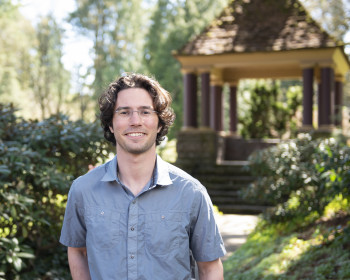Summer student research: Immigration and incarceration
Open gallery

Lewis & Clark students remain closely engaged with their fields of study during the summer months, and many make meaningful contributions to scholarship by collaborating with faculty on innovative research. Maggie Costello ’16 and Sofia Knutson ’16 spent the summer working with Professor of History Elliott Young to study the relationship between immigration and incarceration in the United States and Mexico. They reflect on this experience in the following Q&A.
What are you researching?
We are looking into immigration detention in North America during the 19th and early 20th centuries. Our research strives to answer the question of how we arrived at the mass incarceration of migrants to the United States and Mexico by understanding the history behind migrant detention.
What initially sparked your interest in this project, and how does it relate to your previous coursework?
Latin America is a great passion of ours, and we have both focused on the culture and history of the region in our studies at Lewis & Clark. We have both taken Professor Young’s Colonial and Modern Latin American History course, as well as numerous related courses taught by other faculty members. Thus, the chance to observe the crosscultural phenomenon of migrant detention was extremely appealing to us. Furthermore, the chance to work with such an insightful mentor as Professor Young was simply too amazing to pass up.
How has your Lewis & Clark education been enhanced by close collaboration with faculty?
During our time at Lewis & Clark, we both have been fortunate to develop close relationships with professors. Even before we were presented with the opportunity to collaborate with Professor Young, we were very appreciative of having him as a professor who we could comfortably approach with questions about course material or engage with in casual conversation. Being able to work closely with Professor Young in this new capacity has been especially great because he has not only guided us through a lot of deeply theoretical readings, but has also led us to the very resources that made it possible for those readings to be written.
Have you conducted any of your research off campus? If so, what did that process entail?
Essentially all of our research has taken place off campus, at the Archivo Histórico del Instituto Nacional de Migración (Historical Archive of the National Migration Institute) in Mexico City. While there, we also assisted in a conference titled “Capitalism from the South” at the Tepoztlán Institute for the Transnational History of the Americas. Prior to leaving Portland, we spent time compiling and analyzing newspaper articles, court cases, and congressional documents about immigration detention in the 19th and early 20th centuries. The overall research experience has been very exciting, but we were especially thrilled by the off-campus component because neither of us ever expected to have such a hands-on experience.
Does your research have potential to be applied in the real world, or to influence other work in your field?
Most definitely. First of all, this research will inform an upcoming article and eventual book by Professor Young. Additionally, the work we are doing has bettered our understanding of—and will hopefully teach others about—how North America has gotten to its current state of “crimmigration.”
How will this research experience hopefully impact your future studies or professional pursuits?
Though neither of us really knows what we want to do in the future, working at archives in both the U.S. and abroad has been incredibly educational. We are both very interested in continuing to study Latin America in some capacity beyond Lewis & Clark, so the experience of doing research about Mexico in Mexico seems like a pretty good start.
About the Mellon Foundation
The Andrew W. Mellon Foundation allows students to pursue graduate-level research in the humanities and social sciences. During the summer of 2014, more than 20 students were being sponsored to study such topics as pop culture and national identity in Mexico, immigration of Russian speakers to Oregon, and social mobility among peasants of medieval England. They are conducting research on campus and at diverse sites around the world.
“We firmly believe that engaging students in the practice of their discipline is the best way to prepare them for life beyond the college,” said Jerusha Detweiler-Bedell, interim dean of the College of Arts and Sciences. “Student-faculty research is seen as one of the strengths of our educational experience, and with this grant, we can ensure that students have access to opportunities for collaboration.”
By supporting these endeavors, the Mellon Foundation continues its long legacy of enriching scholarly and curricular offerings at Lewis & Clark.
Katrina Staaf ’16 contributed to this story.
History Department Latin American Studies Collaborative Research
More Newsroom Stories
Public Relations is located in McAfee on the Undergraduate Campus.
MSC: 19
email public@lclark.edu
voice 503-768-7970
Public Relations
Lewis & Clark
615 S. Palatine Hill Road MSC 19
Portland OR 97219

